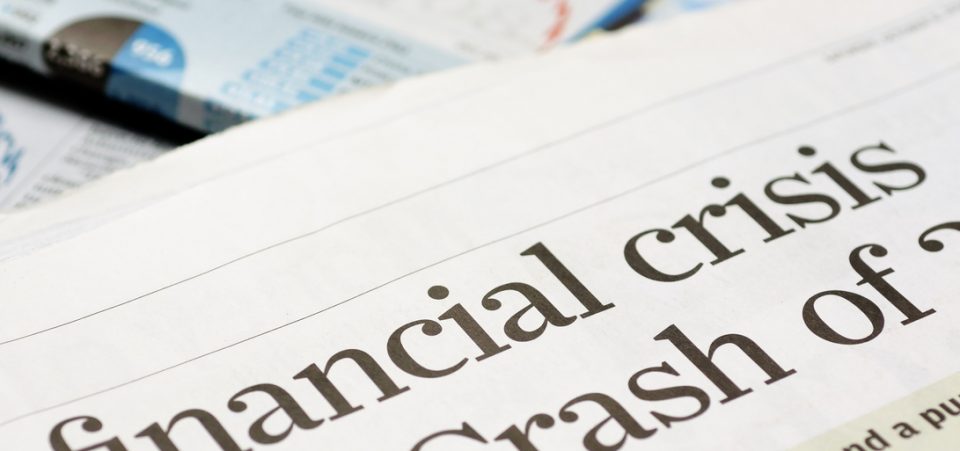The Euro Crisis Suggests Another Financial Crisis Is Probable
No economy is immune from a financial crisis. Perpetual motion exists only in outer space, where the tenets of physics apply to the letter of Newton’s laws.
A financial crisis is an essential component of the capitalist economic system. But all systems, natural or man-made, contain the ingredients of their own disaster. The earth as we know it has come to us through a process of order, destruction, chaos, and back again.
Nevertheless, the economy is a man-made system. It is not subject to the (as yet) unpredictable whims of geology, which moves continents about as easily as it shakes fault lines.
The Next Financial Crisis Has Already Sounded the Alarm
Therefore, a financial crisis, which is a symptom of a sick economy (in its global sense), sends clear enough signals for trained observers to catch.
A financial crisis, moreover, affects just about everyone.
The term “financial” is deceptive. It seems to suggest that a related crisis affects only those who have investments. Or, those who have some sort of stake in the world of finance.
Rather, a financial crisis can deal a hard blow to a country. And, given the reality that the economy is a global affair, a financial crisis has the unpleasant nature of spreading like a virus.
The 2008 financial crisis started in the United States. And it promptly spread worldwide. In fact, even if many of those affected have adjusted now, its effects linger.
The European Union remains especially vulnerable, so much so that the “old continent” may have already triggered the next financial crisis.
All Roads Lead to Rome
Italy is where this crisis begins. And it should come as no surprise. In the EU, Italy was perhaps the country where the effects of the 2008 subprime crash left its biggest mark.
Italy’s participation in the eurozone, or the European monetary system, left it unable to do what many countries do when they face a financial crisis: print more money. That is, after all, what the Federal Reserve did in the United States.
The economic problems stemming from the 2008 crisis quickly infected Italy’s political system, echoing a widespread dissatisfaction with the European Union.
By 2011, Europe’s economic problems reverberated in the Mediterranean periphery.
A sudden cutoff of investments in countries such as Tunisia and Egypt unleashed the so-called Arab Spring.
In turn, the migrant crisis resulting from the North African and Middle Eastern revolts have only served to exacerbate social, political, and economic difficulties in Europe.
And now, the proverbial chickens are knocking at the door again. In a sense, the 2008 financial crisis never really ended and the next one will be nothing more than an intensification or an extension.
Soros Thinks a Crisis Is Coming
Whether you like him or not, George Soros has made a fortune in various modes of financial speculation.
Therefore, when he suggests that a major financial crash is imminent, anyone with a stake in the economy should listen. (Source: “George Soros is worried about another financial crisis,” CNN, May 29, 2018.)
Soros doesn’t have to look far. The political crisis in Italy has no parallels in the post-WW2 era. Its “partners” in the European Union have already expressed deep concerns over Italy’s debt.
The EU solution may be rather like what Germany imposed on Greece in 2014–2015.
Therefore, given that precedent, the focus will be the banks. German banks—and maybe the French too—will demand that Italian banks pay back their debts.
This will leave fewer funds to lend to Italian companies and businesses, which will be forced into recession-like conditions. Italy’s competitors in Germany, France, and elsewhere will be pleased.
The fewer funds for growth and investments in Italy, the higher the chances of Italian companies going into bankruptcy and failing.
After Gobbling Up the Best of Greece, Germany Is Ready for an Italian Meal
There will be cheap assets for purchase and bigger room for competitors to grab market shares in Italy, Europe, and beyond.
Following the Greek script, the virtuous Germans will demand the Italian government increase taxes and reduce public spending in order to pay off its debt.
Oh, and of course, just as a low credit score borrower does in a normal banking situation, Italian banks will be forced to borrow at higher rates than their German or French competitors.
Recession doesn’t even begin to describe the strange brew that will no doubt trigger a major financial and political crisis.
The question at this point, is simple: How long can the eurozone possibly last in such a climate?
The conditions that the EU is imposing are reminiscent of those that the powers, which won World War 1, imposed on Germany. The result was a violent form of right-wing “populism”—or reactionary politics.
Hints that many EU countries could resume this dangerous route abound. The Italian 2018 election results represent, perhaps, the most flagrant example.
The irony is that Germany, which is leading the “virtuous” charge, understands better than anyone the weight of debt and its significant dangers.
The winning powers of World War 2 understood the lesson and canceled all of Germany’s debts, allowing it to rebuild and become the richest European State.
Financial Crises and Nasty Politics
Before the incalculable political damage is considered, the markets should prepare for a crash of Italian bank stocks. And their collapse will resonate around the world. In other words, bank and financial stocks on Wall Street will not be immune.
Given the exorbitant price-to-earnings ratios (P/E) that make up the Dow Jones index, any good excuse is good enough for a sell-off. And a collapse of the euro and the European Union itself, as a political project, is as good as any motivation for a stock market crash and a subsequent global financial crisis.
The problem is that debt in the eurozone should have been tackled sooner.
The euro hasn’t worked because it has essentially functioned in two different classes—or in two different “speeds.”
The first class has been open to the Germans, Dutch, Swedes, and a handful of others. Southern Europeans, in particular, have had to settle for the second class.
This explains, at the raw level, why the euro has attracted so much anger. And why it has become a burden, which magnifies the effects of a financial crisis.
Ten Years Later, It Hasn’t Gone Away
10 years after the collapse of Lehman Brothers Holdings Inc., much of the world is still experiencing the shock from that sting.
Governments, central banks, and private banks have adopted countless measures to confront the financial crisis. Yet, rather than pulling those affected out, they have merely been able to prevent them from sinking further.
If the economy were a sinking ship, then the 2008 crisis was more Titanic and less Andrea Doria.
Many countries—including the United States—are still suffering its effects. The measures taken to avoid an even deeper collapse of the world economy in the long term have caused much pain in the short term.
Despite all the efforts, many of the factors that contributed to the 2008 crash linger. Indeed, the bitter fruits of this legacy are only starting to emerge now.
Years of austerity and risk aversion—in the sense of a reluctance to invest in real business activity rather than financial speculation—are producing predictable political effects.
The 1929 crash and the Great Depression, a decade later, delivered the worst war of the past few centuries—and possibly the worst ever.
As it happens, the possibility of another major conflict exists, given the persistence of regional wars, which are sending all the wrong signals.
Therefore, it is naïve and even a little arrogant to believe, if history serves as a guide, that the worst is over. There is a considerable risk that a new financial crisis will come back to hit the whole world.
No major economic power has really done enough to prevent this from happening. And the vultures are preparing for their next luxury meal. After Greece, they’re going for Italy.






